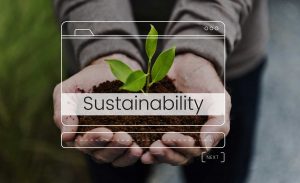Week 12
Beyond Sustainability to Radical Transformation
In the previous lecture we learned how the SDG targets and indicators form the basis of monitoring SDG implementation. In this final week we will be looking at the six transformations necessary to achieve the 2030 Agenda.
Going beyond sustainability
 It was not until the 1980’s that the concept of sustainability became broadly known and understood as the practice of balancing the environment, society, and economies in a way that could meet the needs of present populations without compromising the ability of future generations to meet their own needs[1]. For many people, sustainability came to represent the actions required to ensure their current standard of living could be maintained or improved while ensuring a comparable if not better standard for the next generation[2]. This way of thinking has come at the expense of the environment and ecological systems. Unfortunately, after three decades of ineffective sustainability understanding and action, societies are taking more than they need (especially from nature) and not leaving enough for future generations2.
It was not until the 1980’s that the concept of sustainability became broadly known and understood as the practice of balancing the environment, society, and economies in a way that could meet the needs of present populations without compromising the ability of future generations to meet their own needs[1]. For many people, sustainability came to represent the actions required to ensure their current standard of living could be maintained or improved while ensuring a comparable if not better standard for the next generation[2]. This way of thinking has come at the expense of the environment and ecological systems. Unfortunately, after three decades of ineffective sustainability understanding and action, societies are taking more than they need (especially from nature) and not leaving enough for future generations2.
There is an urgent need to move beyond the belief that just because we are using practices that may appear to minimize human impacts on the environment, we are acting sustainably. Most societies have developed systems that are not able to maintain sustainable trajectories. The current patterns of production and consumption are not sustainable and must be changed for our own welfare and that of our future generations2. Human health and the environment are intrinsically linked, yet we carry on as business as usual, guided by unrealistic notions of infinite economic development and growth that ignores the reality that we live on a planet with finite resources2.
We need a new path forward that goes beyond the traditional sustainability discourse. Defining sustainability as three separate pillars (economic, society, environment) has led to each receiving different value. The environment rarely receives equal weight or treatment, often seen as a nice thing to consider if there is time and money left over.
A radical change in the way societies function is required to avoid further grave predictions as seen in the International Panel on Climate Change (IPCCs) recent report[3]. This will require all 200+ countries around the world, working simultaneously together to create the deep changes necessary to lead to new ways of doing business. To create a safe operating space for all of humanity, we need to change direction in a radical way.
Radical transformation
 Going beyond sustainability calls for radical transformation of the current social-ecological system and its underlying defective worldview. There is growing awareness that the current worldview driving our action, locally and internationally, is one which supports resource exploitation, the accumulation of profit, and infinite growth with humans at the centre seen as most dominant. This human exploitation of the environment has enabled the business-as-usual attitude and is the root cause of our current planetary crisis.
Going beyond sustainability calls for radical transformation of the current social-ecological system and its underlying defective worldview. There is growing awareness that the current worldview driving our action, locally and internationally, is one which supports resource exploitation, the accumulation of profit, and infinite growth with humans at the centre seen as most dominant. This human exploitation of the environment has enabled the business-as-usual attitude and is the root cause of our current planetary crisis.
Transformation is understood as a profound change which requires a fundamental shift in mindset[4]. Radical transformation looks at the root cause of problems and gets to the core of the issue. This usually requires a shift away from the type of thinking that created the problem(s) in the first place4. Changing mindsets can be very challenging but it is possible. The status quo cannot effectively address the sustainable development challenges we face. What is required is a radical transformation of how we conceive of ourselves and the world we live in, with the environment as the essential foundation for sustainability reforms[5].
To move beyond sustainability and to protect people and the planet, a new conceptualization of sustainability with the environment at the foundation is needed5. Only when the environment is healthy and robust can the next level (society) start to flourish. When environments are thriving and resilient, only then can societies and strong economies be accomplished.
Video
In this 16-minute video made available from the SDG Academy, Jeffery Sachs looks at the six radical transformations that will be necessary to achieve the SDGs, including: education, skills and jobs; health and wellbeing; clean energy and industry; sustainable land use; sustainable cities; and the digital revolution.
Exercise
Comprehension Questions
Discussion Question
- Communities are facing significant challenges due to climate and environmental changes caused by human activities that result in land degradation, ocean and air pollution, and biodiversity loss. Changing mindsets and bringing more awareness can create a new path for humans and the planet. Alone, nobody can change the world, but small groups of people working together can change part of it. Over time, these small changes create radical transformation, and the world is forever changed, for the better.What are some areas in your life where you can work locally towards the transformations needed to help set your community on a more sustainable path and help achieve the SDGs?
Recommended Reading
- Most of the videos provided in this course were made available through the SDG Academy. The SDG Academy is the flagship education platform of the Sustainable Development Solutions Network (SDSN), a global initiative for the United Nations. The Academy creates free, open educational resources on sustainable development and offer them as a global public service.We encourage you to explore the SDG Academy at https://sdgacademy.org/
- United Nations. (2021). 1987 Report of the World Commission on Environment and Development: Our Common Future. (page 41) ↵
- Robinson, N. A. (2012). Beyond sustainability: Environmental management for the Anthropocene epoch. Journal of Public Affairs, 12(3), 181-194. ↵
- IPCC. (2021). Climate Change 2021: The Physical Science Basis. Contribution of Working Group I to the Sixth Assessment Report of the Intergovernmental Panel on Climate Change. ↵
- Massarella, K., Nygren, A., Fletcher, R., Büscher, B., Kiwango, W. A., Komi, S., … Percequillo, A. R. (2021). Transformation beyond conservation: How critical social science can contribute to a radical new agenda in biodiversity conservation. Current Opinion in Environmental Sustainability, 49, 79-87. ↵
- Brock University UNSECO Chair. (2021). We can’t protect our planet without radically changing our worldview. ↵

